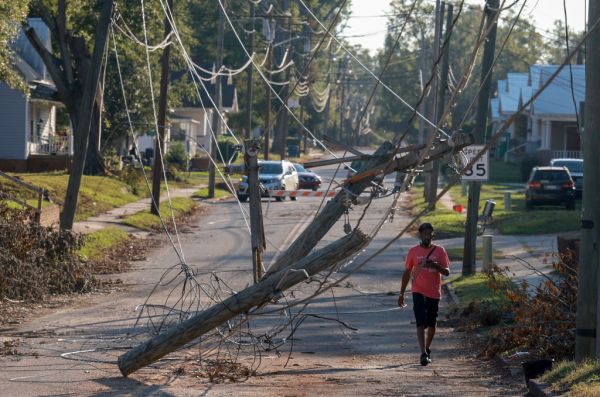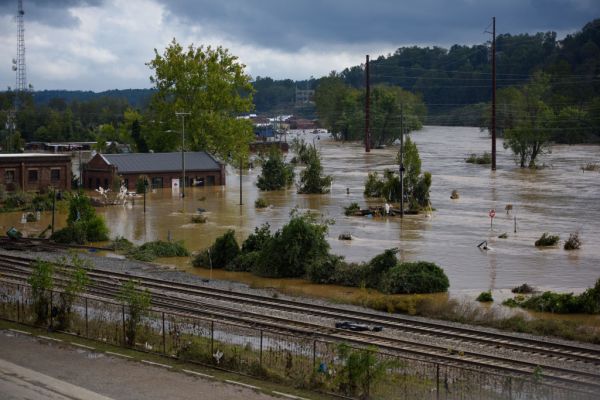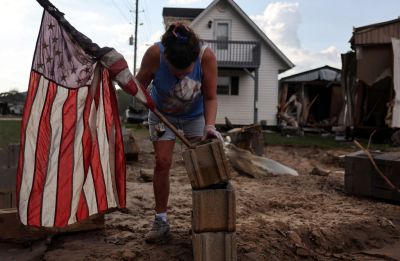Happy Tuesday! Raise your hand if you want your Morning Dispatchers to go on a well-documented road trip like our friends Mike and Drucker. 🤚
Quick Hits: Today’s Top Stories
- Two American scientists—the University of Massachusetts’ Victor Ambros and Gary Ruvkun of Harvard University—were awarded the 2024 Nobel Prize in Physiology or Medicine on Monday for their discovery of microRNA, which the Nobel Assembly said “revealed an entirely new dimension to gene regulation,” comparing it to “an instruction manual for all cells in our body.”*
- A Russian court on Monday sentenced 72-year-old U.S. citizen Stephen Hubbard to six years and 10 months in prison following allegations that he had served as a mercenary in Ukraine. Russian officials said he joined a Ukrainian defensive military unit in the eastern part of the country and was captured by Russian soldiers in April 2022. Russian state media reported that Hubbard and his lawyer plan to appeal his sentence.
- Ukraine’s military said on Monday that it had successfully struck a much-used oil terminal on the Russian-occupied Crimean Peninsula near the Black Sea city of Feodosia. Ukrainian military officials said that more petroleum products pass through the facility than any other Crimean oil terminal and are used by the Russian army.
- Hezbollah, an Iranian-backed terrorist organization based in Lebanon, launched missiles on Monday at the port city of Haifa in northern Israel in an attack Israeli officials said injured 10 people. Rockets that struck near the central Israeli city of Tiberias injured two more people. Later on Monday, the Israel Defense Forces (IDF) said that its air force targeted more than 120 Hezbollah sites in southern Lebanon and the country’s capital city of Beirut, including military headquarters, fighters, and missile stockpiles. Meanwhile, two people were injured on Monday in a Hamas rocket attack on Tel Aviv. The IDF later returned fire on southern Gaza, destroying the launchpad it said Hamas used to fire rockets into central Israel.
- The Biden administration on Monday issued new sanctions against three individuals and entities it said helped financially assist Hamas, including a Hamas-operated, Gaza-based financial institution, a prominent Hamas supporter and his business, and other individuals providing financial backing to Hamas. State Department spokesman Matthew Miller said the sanctions would help weaken Hamas’ global financial network.
- The National Hurricane Center announced on Tuesday morning that Hurricane Milton has weakened slightly into a Category 4 storm after reporting Monday that it had “explosively intensified” into a Category 5 storm with sustained winds measuring as high as 180 miles per hour. Milton, which developed in the Gulf of Mexico, is projected to make landfall in the Tampa Bay area on Wednesday evening with mandatory evacuation orders already having been issued across six Florida counties. President Joe Biden declared a state of emergency in Florida on Monday, mobilizing the Department of Homeland Security’s Federal Emergency Management Agency (FEMA) to “coordinate all disaster relief efforts” to prepare for the storm.
- Georgia’s state Supreme Court on Monday temporarily reinstated the Living Infants Fairness and Equality (LIFE) Act—which features a ban on most abortions after a fetal heartbeat can be detected, usually at about six weeks of gestation—until the court decides on the merits of a legal challenge to the law. Early last week, Fulton County Superior Court Judge Robert McBurney struck down the LIFE Act, first passed in Georgia in 2019, ruling that the abortion restriction violates the state constitution. Monday’s decision from Georgia’s Supreme Court will allow the LIFE Act to go into effect until the court rules to either uphold or overturn McBurney’s decision.
Helene’s Long Tail

Folks in the hills and mountains of East Tennessee and western North Carolina aren’t accustomed to seeing the distinctive double rotors on Army-green Chinook helicopters flying overhead in tight formations, descending below the tree line, and getting airborne again.
But they now come and go frequently with elements of the U.S. Army’s 101st Airborne Division temporarily stationing itself at the small municipal airport in Greeneville, Tennessee. The 101st and newly arrived units of the 82nd Airborne Division in Asheville, North Carolina, are now running frequent missions to drop supplies in some of the most isolated pockets of the lower Appalachian mountains still mucking themselves out from the damage of Hurricane Helene.
In places like Asheville or the college mountain town of Boone, North Carolina, recovery has moved from reacting to the acute needs of the historic floods and transitioned into longer-term rebuilding: re-establishing utilities and communications and figuring out how to return at least some aspects of life back to something resembling functional. But in isolated and rural places, volunteers and community members are still just trying to get basic necessities—such as water and food—to those who have spent a week cut off from the outside world.
“Twenty miles one way or the other means the world up here,” David Jackson, president of the Boone Area Chamber of Commerce, told TMD. “That sends water down a different ridgeline or sends it into a different valley.”
When Hurricane Helene made landfall on the evening of Thursday, September 26, near Florida’s Big Bend, it had already been raining in lower Appalachia for two days, inundating the ground ahead of Helene’s arrival. In Boone, the worst of what was by then tropical storm Helene moved out of the area by about 4 p.m. on Friday afternoon. “It was hard to understand the severity of anything because you couldn’t get anywhere and you couldn’t make a phone call,” Jackson said.
So—just as in Asheville—people went old-school, reaching for local radio to glean what they could about what was happening. “People [were] pulling radios out of closets they forgot they had,” Jackson said.
Across western North Carolina and eastern Tennessee, houses were swept away with people still in them, or clinging desperately to the roof. And the physical risks continue: The U.S. Geological Survey has reported more than 400 landslides in the impacted region since September 27, and of those, around 300 have affected rivers, roads, or other infrastructure.
The death toll is already staggering: Some 230 people have died as a result of the storm, of whom more than 70 were killed in North Carolina. As rescue teams reach remote “hollers”—narrow, sparsely populated valleys that may have just had one way in and out—and houses cut off from the outside by debris or mud, the death toll is likely to increase. Hundreds of people are still missing or unaccounted for.
Michael Moore, a 31-year-old physical therapist who lives in Boone, spent several days last week as part of a chainsaw gang with other members of his church. Moore said in those inaccessible hollers, getting through the “marriage of trees and powerlines” represented one of the biggest challenges for volunteers looking to reach people whom the storm had cut off, as did the roads themselves. “We don’t know how much of the road is there structurally,” he told TMD. “You’re driving around trying to stay away from the shoulder on either side because you don’t know how hollow it is underneath.”
Cell service has been spotty or nonexistent in many areas in western North Carolina since the storm, making it difficult to get in contact with loved ones and coordinate rescue or aid. But the situation has apparently improved slightly in the last several days: North Carolina’s state government said Sunday that service providers are reporting that roughly 80 percent of the region has had cell service restored.
But some of the remaining damaged cell towers are totally inaccessible—either by the utility crew or by electricity needed to power the tower. “In some cases, they’re cutting new roads to get to those locations, to get to those towers, or they’re having to lay completely new infrastructure to get to them,” Jackson told TMD. “It’s been almost an individual process to assess all of that.”
State search-and-rescue teams are also using Starlink systems—satellite internet service provided by Elon Musk’s SpaceX—to coordinate in remote areas. On Sunday, the Federal Communications Commission (FCC) granted emergency permission for Starlink to provide their premarket cellular coverage to phones in the affected region of North Carolina on the T-Mobile network.
As the tourist-dependent town of Boone moves beyond immediate relief, the question becomes recovery. Boone is home to Appalachian State University—though classes have been canceled through the end of this week, and the status of the rest of the semester is still uncertain. In 2023, visitors to Watauga County, which includes the town of Boone and countless nearby hiking destinations, spent $517.51 million. Recovering that tourism in a way that provides for the town but doesn’t overwhelm it before it’s recovered will be tricky, Jackson said. The recovery across the Southeast could cost more $34 billion.
But just because the town has more-or-less stabilized doesn’t mean there aren’t tough days ahead. Now people there need items like winter gear: “Jackets, long sleeve shirts, hats, gloves, boots,” he said. “The things that people don’t realize they’ve lost yet until the temperature hits 35 degrees here Thursday morning and they go to reach for a coat they don’t have anymore.”
There’s been lots of out-of-state help in the area—both from the government and from civilians lending a helping hand. There are now 1,500 active duty troops in North Carolina. They joined more than 6,000 members of the National Guard and 7,000 federal employees—including U.S. Forestry Department teams there to clear downed trees—on the ground in the state.
So busy were the skies over the affected area on Saturday, September 28—just one day after the storm swept through—that there were some 30 mid-air near-misses between aircraft. “With so many airports flying people, I’m absolutely amazed we had no air-to-air collisions or anything,” one recreational pilot coordinating civilian aid flights in the area told TMD. “From everything that was going on, it’s a miracle how we had so much safety in the sky.”
Several local airports, including one in Asheville, now require pre-approval to land there, and local authorities have the power to institute “temporary flight restrictions” in some areas that would require planes to get approval to fly in the designated airspace.
The world’s richest man had something to say about that. Musk, the X owner whose Starlink internet service has been indispensable in some parts of the affected area, has also been among the boosters of conspiracy theories about the federal government’s response to the hurricane, frequently claiming that FEMA and other agencies were intentionally blocking aid to the affected areas. So prolific have these theories—and other, even darker ones—become online that a Republican state senator in North Carolina begged his constituents in a Facebook post to “help stop this junk,” adding, “It is just a distraction to people trying to do their job.”
On Thursday, Musk tweeted a screenshot of what appeared to be a conversation with someone supposedly helping to deliver Starlink systems by air claiming that “they” were “about to shut the Air space” over North Carolina and that the Federal Aviation Administration was “throttling flights for our choppers” by requiring additional information about their flight plans. “The level of belligerent government incompetence is staggering!!” Musk commented.
Secretary of Transportation Pete Buttigieg responded to the post, inviting Musk to call him. And, indeed, he did, Buttigieg confirmed. “Thanks for expediting approval for support flights,” Musk tweeted later. “Just wanted to note that Sec Buttigieg is on the ball.”
The Republican nominee for president has likewise spent the last several days claiming online, in front of cameras, and before crowds of people at rallies that the Biden administration shortchanged the disaster relief agency. Former President Donald Trump has said the Biden administration has given the funds to “Illegal Migrants”—a claim that Alex debunked in a fact check yesterday.
And on the score that FEMA is intentionally denying aid? It doesn’t ring true to David Jackson, who said the first FEMA team arrived in Boone within hours of the storm passing. “We have met these people,” he said. “We have shaken their hands. To hear that they’re not here is just outright—not only inaccurate, but it is insulting to their process and to our community. Because we are being helped by these people on a daily, minute-by-minute basis.”
Worth Your Time
- While conservatives have expressed deep opposition to the diversity, equity, and inclusion (DEI) movement prevalent in academia, should they similarly oppose equity as an educational principle? In National Affairs, Michael Petrilli argued no. “It’s a mistake for those on the right to shun the conversation about educational equity, for two reasons,” he wrote. “First, most educators aren’t hard-core ideologues seeking to trample our traditions of individual responsibility. … When they hear calls for ‘educational equity,’ they think it means simply doing right by children often shortchanged by schools—especially low-income students and students of color. In short, they want what most on the right would call ‘equality of opportunity.’ Many of these educators are open to counterpoints to the left’s vision of equity. Second, political conservatives can nudge these educators toward a version of educational equity that isn’t at odds with excellence. … Their goal should be to do educational equity right.”
- Three years ago, a home church community in China fled the country together. Plough magazine interviewed the pastor, Pan Yongguang. “The person who preached the gospel to me was a member of a house church,” he said. “As my faith matured, I realized that the Three-Self Church authorized by the atheist Communist Party of China is not true Christianity but a tool for ideological rule. In China, the house churches are the true churches that follow the teachings of the Bible. When I became a pastor, I knew that if I established a house church it would inevitably be suppressed by the government, and I was ready and willing to pay the price.”
Presented Without Comment
The Hill: Trump: Israel Has To ‘Get Smart’ About Supporting Him
“I think that Israel has to do one thing. They have to get smart about Trump, because they don’t back me,” Trump said. “I did more for Israel than anybody. I did more for the Jewish people than anybody. And it’s not reciprocal, as they say, not reciprocal.”
Also Presented Without Comment
Washington Post: Nevada Republican Convicted Of Taking Money Meant For Officer Memorial
Michele Fiore was found guilty of taking money meant for a memorial honoring a police officer killed in the line of duty and spending it on plastic surgery, rent and her daughter’s wedding.
In the Zeitgeist
As election season heats up and the public discourse gets nastier, it’s a good thing we have Nate Bargatze to remind us of the rights and privileges the Founding Fathers secured:
Toeing the Company Line
- Steve joined Tortoise Media’s podcast The News Meeting last week to talk about “the voters who will decide the US presidential election.” Give it a listen by clicking here.
- Stay tuned for another episode of the Dispatch Book Club dropping next week: Sarah will be joined by Kelefa Sanneh to discuss his book Major Labels about the music industry.
- In the newsletters: From the ground of Asheville, North Carolina, Kevin reported on (🔒) recovery efforts more than a week after Helene made landfall, and Mike and Drucker reported from the road in Pennsylvania, and Nick traced (🔒) how Elon Musk is effectively becoming Trump’s minister of propaganda.
- On the podcasts: Sarah and David are live from UNC to unpack Jack Smith’s filing in his election interference case against Trump on Advisory Opinions.
- On the site: Chris explains why a local ballot initiative in Washington, D.C., may get him to the ballot box this November, and we publish our first installment of a series of symposia on concerns about particular policy outcomes for the presidential election. First up: national security.
Let Us Know
Have you seen conspiracy theories about the Helene response online?
Correction, October 8, 2024: A Quick Hit originally mislabeled the Nobel Prize awarded to Victor Ambros and Gary Ruvkun and erroneously conflated microRNA and mRNA. mRNA (messenger RNA) contributed to COVID-19 vaccine development, not microRNA.










Please note that we at The Dispatch hold ourselves, our work, and our commenters to a higher standard than other places on the internet. We welcome comments that foster genuine debate or discussion—including comments critical of us or our work—but responses that include ad hominem attacks on fellow Dispatch members or are intended to stoke fear and anger may be moderated.
With your membership, you only have the ability to comment on The Morning Dispatch articles. Consider upgrading to join the conversation everywhere.